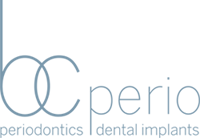For mild periodontal disease, BC Perio utilizes a way to effectively control periodontal infection and help patients heal in a simple, less invasive and less expensive way. The technique is simply called “scaling and root planing”. The results of this technique have been shown to reduce “pockets” and reduce bleeding.
The “scaling” is typically done using local anesthesia, with very small ultrasonically powered probes (“micro ultrasonics”). This cleaning technique very thoroughly cleans diseased roots and pockets with micro ultrasonic vibrations of the instrument, as well as, with highly energized flushing of water irrigation (patients who are anxious about treatment can elect to be orally or intravenously sedated before the local anesthesia and during the treatment).
Because there are specific bacteria that invade the gum tissue and affect the bone, BC Perio has found that a course of a systemic antibiotic helps to eliminate any bacteria residual to the cleaning. The antibiotic used may vary based on patient tolerances to different medications. When the infection is generalized it is better to use systemic medications (oral pills). However, when the infection is more localized, antibiotic gels may be placed directly into the pocket to provide the disinfection. These local antibiotics work in the gum for over a month as they dissolve.
After the Procedure
Patients typically have little or no discomfort after the initial procedure, and a reevaluation is performed after 6 weeks to check the initial response to treatment. Subsequently, patients are asked to have supportive periodontal treatments at 3-4 month intervals for one year. These treatments are micro ultrasonic cleanings (without anesthesia and without antibiotics) and are performed to support healing by keeping the teeth above and below the gumline as clean as possible. Additionally, we help our patients with their effectiveness in cleaning at home.
After a year, selected x-rays are taken and a reevaluation of the healing response is performed. At that point long term management options are discussed. Sometimes, surgical treatment is recommended. However, BC Perio estimates that, of the teeth that originally have mild infection with pockets and bone loss, over 90% of these teeth no longer require surgical treatment (this is consistent with other published studies).
Periodontics has made great strides in the surgical and non-surgical management of periodontal problems. With this conservative technique, BC Perio has been able to allow many patients to reach periodontal health in a simple, effective, less invasive and more affordable way.
If you have any questions regarding this approach, please do not hesitate to contact us.

